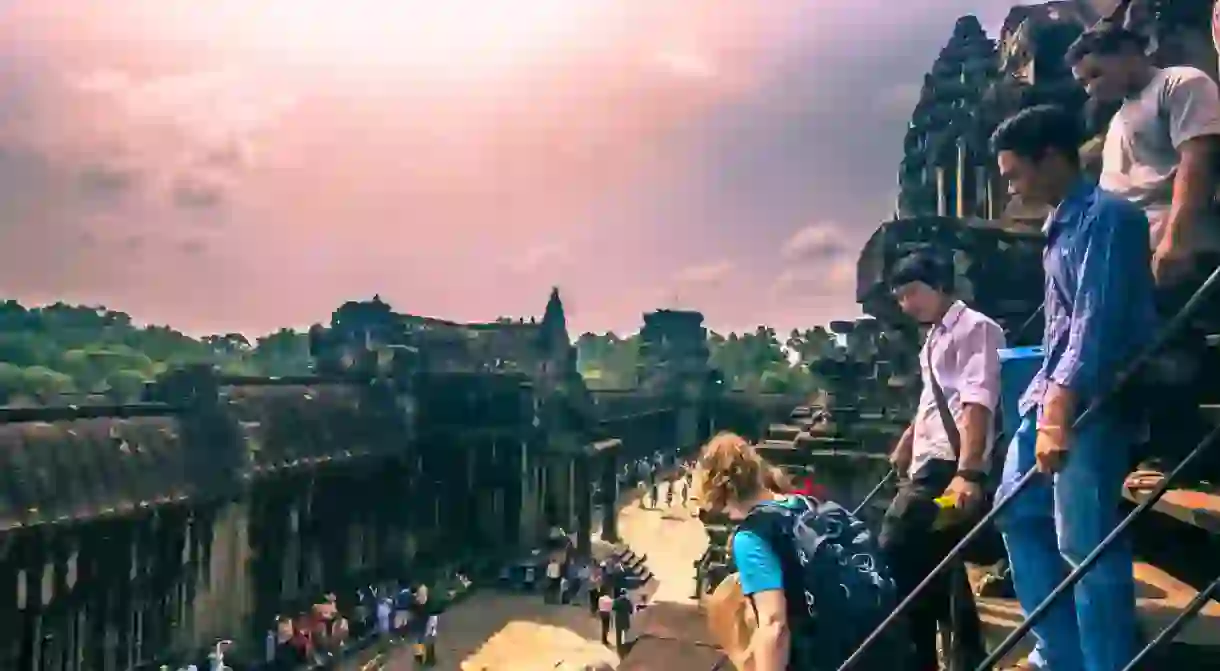10 Things to Know Before you Go to Cambodia

Cambodia is a beautiful country, rich in culture, customs and religion. Here are a few tips you should know before packing that will help enhance your trip to the Kingdom of Wonder.
Buddhism Rules

By nature, Cambodians are gentle so when you’re walking through the capital inappropriately sporting a bikini top or no shirt for men, don’t expect to be confronted. However, do expect to insult. Buddhism dominates in Cambodia and Cambodians are modest people, so remember where you are and dress appropriately. When entering pagodas, religious structures, temples or palaces, women must cover their shoulders and wear a skirt or trousers that fall below the knees. Several tourists last year found themselves in court after posing nude at Angkor Wat.
Greeting
There’s no shaking hands or waving in Cambodia. The official way of greeting is a sampeah, and there are different ways of carrying this out to show respect. The sampeah is achieved by placing both palms together like a lotus flower in front of the chest. For peers, the level is kept at chest height, for elders or higher-ranking people, the hands are placed at mouth level, and for parents, grandparents or teachers, it is at nose level. For kings and monks it is at eyebrow level, and when praying, it reaches the forehead.
Loss of Face
Cambodians smile at everything. This doesn’t always mean they are happy or that when they nod and smile in agreement that they understand, which can become frustrating. Loss of face is a huge issue in Cambodia, which includes admitting you don’t know something. Often, if the smile is followed by a nervous giggle, it’s best to ask again. So when you order your meal without extra chilli and the waitress smiles, looks slightly baffled and lets out a laugh, it’s best to double check your order.
Keep Your Cool
Getting back to the loss of face, anger gets you nowhere in Cambodia. Shouting or raising your voice will only cause embarrassment to the person you’re directing your anger at and will only further fuel the situation. Remember to stay calm, firmly reiterate your point and try explaining further.
Driving in Circles

Most tuk tuk drivers at hotels will have a working knowledge of the city but don’t expect others to, even if they claim to know where they’re going [see above point on Loss of Face]. It’s best to vaguely figure out your route first, or use Google maps to direct you. Don’t be fooled into thinking pointing it out on a map will help because when it’s being read upside down and the driver is vaguely pointing somewhere, you’ll sharp realise many can’t read maps either.
Bartering
Get practicing your haggling skills because unless there’s a price tag, the cost is negotiable. Expect to pay inflated prices because you’re a tourist, but never agree on the first price because it will be at least double. Walking away often helps because they’ll call you back; if they don’t then you know you’ve pushed them too far. Remember to agree on prices for tuk tuks and motorbikes before jumping in to avoid hiked up prices when you try and get out.
Currency
Cambodian currency is the riel but the American dollar rules. Generally, riels are only used for small transactions – under a few dollars – with dollars used otherwise. Small change dominates in Cambodia, so don’t expect to pay for your tuk tuk with a $100 or even a $20 note. Also, remember to keep notes crisp because many places won’t accept torn ones, especially of higher value. Wrinkled $100 bills are also often not accepted.
Don’t Give to Kids
Despite the rising economy and swelling middle-class, poverty is rife across Cambodia and tourist hotspots come coupled with both begging and selling. Kids often sell books, bracelets and trinkets at bars and restaurants throughout the day and night. No matter how cute they are or how convincing they seem, don’t fall into the trap of buying or giving as this only serves to fuel the cycle. NGO Friends International has devised a series of tips for travelers. Visit www.childsafe.org.
Rise Early

Due to Cambodia’s relentless heat and humidity, the day starts early in Cambodia with most locals rising at dusk and the day moving into full swing by 8am. With any sensible person avoiding the outdoors during the midday heat, the mornings are the best time to take trips to the market, stroll the streets and visit temples. This also means early bedtime, with many local restaurants closing their kitchens at about 9pm.
Learn the Language
We don’t expect you to become fluent in Khmer but picking up a few bits really does go a long way – notice the pleasant surprise on your tuk tuk driver’s face when you say hello.
Hello: Sou sdey
Good bye: Li hi
Thank you: Ah kun
Sorry: Sohm tou
How are you?: Soksaby?













